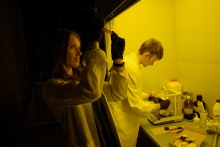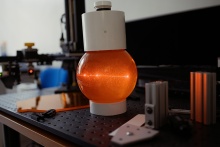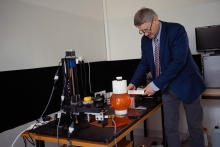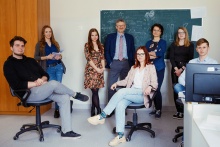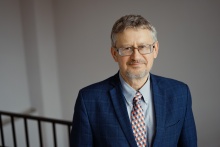Date added: 2022-06-03
Technology improving the effectiveness of radiation therapy for treatment of cancer and other diseases
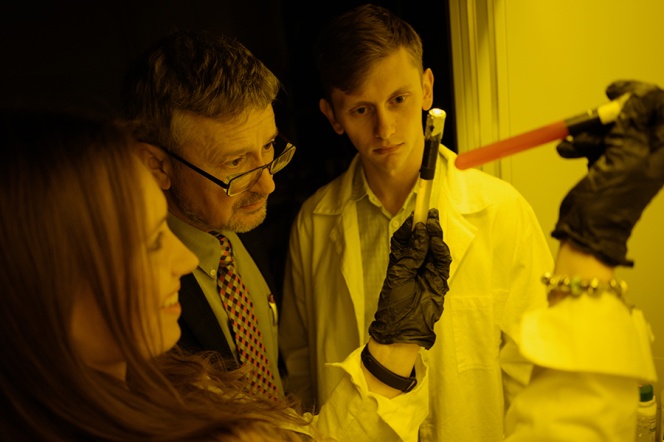
– The success of next-generation radiotherapy, which will increasingly use protons and heavier ionizing particles, showing greater biological effectiveness than the most commonly used X-ray or gamma photons, depends largely on the ability to quickly and accurately measure spatial distributions of doses and other important parameters. Therefore, there is the need and it is the goal of our research to develop a new type of gel phantom dosimeters (simulating human tissues), taking into account the differentiation depending on the type of radiation and the type of tissue, e.g. brain, muscle, lung – says Prof. Marek Maryański from the Institute of Nanotechnology and Materials Engineering at the Faculty of Applied Physics and Mathematics of Gdańsk Tech (WFTiMS), adding that the preliminary results of the research give hope that the method of verifying the precision of irradiation, which his team is working on, has a very good chance of success and will enter clinics around the world.
– Already last year, together with our clinical partners, we published test evidence that our method can detect "dose cloud" shift errors down to 0.5 mm. Such high precision is of particular importance, e.g. in tumor metastases within the brain, where the changes can be very small, numerous, and scattered. A mistake by a millimeter is enough to cause the target to be missed and only partially irradiated, and at the same time we damage healthy tissue, which may be, for example, the optic nerve, brainstem, or other critical organs – emphasizes Prof. Maryański.
The students are testing the properties of new gel dosimeters
The project (as part of RADIUM grants) involves graduate students of medical physics and biomedical engineering, supervised by Prof. Brygida Mielewska, Vice-Dean for Education at WFTiMS.
Under the RADIUM grant, Marta Cichacka is modelling and studying the nanostructural mechanisms of the radiochromic response of gel dosimeters under the influence of radiation (samples are to be irradiated in the summer with, among others, helium and carbon ion beams at the University of Heidelberg and with neutrons at the National Center for Nuclear Research in Świerk). Sylwia Szczepańska is analyzing theaccuracy of novel methods of measuring some of the most important dosimetric parameters in proton therapy, in collaboration with the Institute of Nuclear Physics of the Polish Academy of Sciences in Krakow. Julia Leszczyńska, on the other hand, is analyzing possible methods of shortening the scan time of irradiated gels in a laser tomography scanner, which is currently under construction at the Faculty’s laboratory.
– The laser tomography scanner we are building is sufficiently accurate, but still too slow. Scanning a spherical phantom the size of a human head with a resolution of approximately 1 mm takes about 45 minutes. The ambitious goal is to shorten this time down to 2-5 minutes, which is of great importance if we think about introducing the device to clinics – emphasizes Prof. Maryański.
On the other hand, students Marta Cichacka, Julia Krzemińska, Anna Kusznerczuk and Klaudia Prusik (as part of the TECHNETIUM grant) will study some critical physical properties of the dosimeter, relevant to storage conditions, dosimetric sensitivity, optical and mechanical properties.
In addition, (as part of the PLUTONIUM grant, applicant – Prof. Mielewska), a group of 15 students from the BioPhoton Student Research Club will participate in the initial integration of the entire measurement system, consisting of dosimetric gel phantoms, a laser tomography scanner and scan control software, including reconstructing the 3D image, comparing measurement data with patient-specific treatment plan and generating a concise final report for medical physicists responsible for the accuracy of patient radiation in radiation oncology clinics.
Cooperation with leading institutions of the world
It is planned (as part of the AURUM grant) to create an international consortium (Poland, USA, Belgium) focused on two trends in modern proton therapy: FLASH therapy and ARC-proton therapy.
The first one is a therapy that enables precise delivery of the entire therapeutic dose in an extremely short time on the order of 0.1 sec. Here the Gdańsk Tech research team collaborates with the Roberts Proton Therapy Center at the University of Pennsylvania in Philadelphia (USA), one of the world-leading research teams in this field.
– The second technique, ARC-proton therapy, involves using precisely controlled rotation of the radiation beam source around the tumor area in order to match the "dose cloud " to the shape of the neoplastic lesion as best as possible. This is an experimental method in proton radiotherapy and the only hospital in the world where a prototype of the device is functioning is the Proton Therapy Center at William Beaumont Hospital in Michigan (USA), with which we collaborate.
The third international partner is the Université Catholique de Louvain (UCL) in Belgium, which neighbors and works closely with Ion Beam Applications (IBA), a pioneer and world leader in the production of cyclotrons for proton therapy.
The team of Prof. Maryański also collaborates with national clinical partners: the Division of Medical Physics at the Department of Oncology and Radiotherapy of the Medical University in Gdańsk, the Oncology Center in Bydgoszcz and the only proton therapy clinic in Poland at the Institute of Nuclear Physics of the Polish Academy of Sciences in Krakow.
Assistants of Prof. Maryański in the project are doctoral students M.Sc. Marta Marszewska (medical physics) and M.Sc. Jakub Czubek (nanotechnology). The research team is supported by mathematicians from the Faculty in an effort to develop new methods ofanalysing millions of measurement data points.
From USA to Gdańsk
Prof. Marek Maryański is the creator of one of the most innovative methods of imaging 3D distributions of ionizing radiation doses in polymer gels that simulate human tissues in elemental composition and density. His method is based on laser tomography of transparent gel phantoms (representing a part of the patient's body), whose color and optical density change in proportion to the absorbed radiation dose. Therefore, it can be used, among others, to verify the precision of radiotherapy treatment delivery.
Prof. Maryański returned to Gdańsk University of Technology (he is a Gdańsk Tech graduate) as part of the five-year "Polish Returns" program of the National Agency for Academic Exchange after over 30 years spent on research and development in USA. He taught at Yale University and was an associate professor of radiation oncology at the Columbia University Medical Center in New York. The research purpose of Prof. Maryański’s presence at Gdańsk Tech is to complete the development of HD 3D dosimetry technology for clinical applications in hadron therapy. The following projects supported by IDUB grants are part of the research plan carried out under the “Polish Returns” program:

High-Definition 3D Dosimetry and Quality Assurance for Boron-Neutron Capture Therapy Clinics, PLN 99 980

Characteristics of polymer clusters induced by heavy ion beams in polymer-gel dosimeters, PLN 24 000
Analysis of measurement accuracy of spatial distribution of the deep dose and LET in proton therapy through transmission tomography on polymer gel dosimeter phantoms, PLN 24 000
Prototype method of shortening the scanning time in transmission tomography for three-dimensional gel dosimetry in radiotherapy, PLN 24 000

Laser CT Scanning of Polymer Gel Dosimeters for High-Definition 3D Quality Assurance in Advanced Proton Therapy of Cancer: Arc-PT and FLASH, PLN 499 999

Initial study and modification of the physical properties and radiochromic response of polymer gel dosimeter phantoms in the fields of photon and hadron beams, PLN 24 999, 70

Initial integration of a medical device: laser computed tomography of gel phantoms in dosimetry and verification of treatment quality in radiosurgery and photon and hadron radiotherapy, 165 600
The aforementioned projects are implemented under BioTechMed Center.


